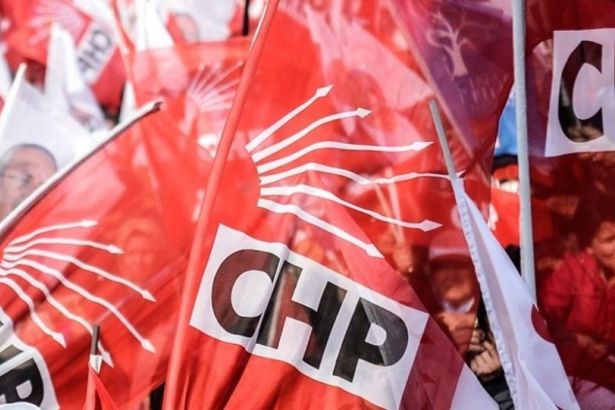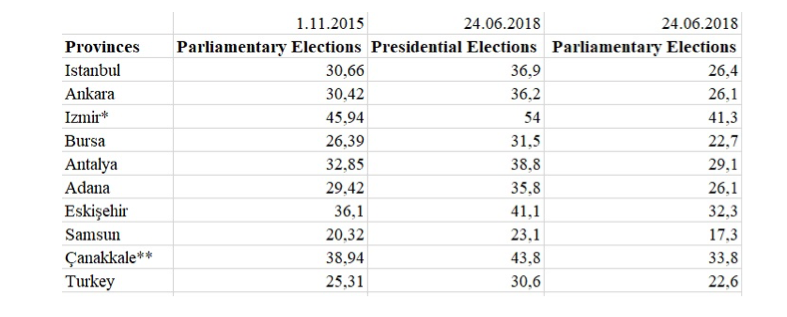CHP party in decline, its candidate on rise

The parliamentary main opposition Republican People’s Party (CHP)’s presidential candidate Muharrem İnce said following the June 24 elections that the CHP and its line has exceeded 30% for the first time after 41 years. That’s true, but the CHP’s voting rate in parliamentary elections has declined compared to the previous parliamentary elections held on November 1, 2015. While the voting rates of ultra-far İyi (Good) Party and pro-Kurdish Peoples’ Democratic Party (HDP) have increased in the regions where the CHP is on the decline, the votes received by Muharrem İnce were more than the votes cast to the CHP in the parliamentary elections in 2018.
While the CHP’s voting rate was 25,3% in the November 1 elections in 2015, this rate has decreased to 22,6% in the June 24 elections. Yet, the votes received by İnce in each region throughout the country were also higher compared to the votes of the CHP in the previous elections.
The comparison of the votes received by Muharrem İnce with the CHP’s voting rates in the November 1 parliamentary elections in 2015 in major cities is as follows:

*CHP ranked in the first political party.
**CHP had ranked the first party after the June 7 elections in 2015 in Çanakkale. Yet, it had been supplanted by the AKP after the elections held on November 1, 2015
CHP LOST ITS VOTERS TO HDP IN MAJOR CITIES
The CHP has been significantly on the decline in Istanbul, the most-populated metropolis of Turkey. While the CHP’s voting rate decreased almost by 4% in Istanbul, the HDP’s voting rate increased by 2,5%. Yet, the voting rate of the HDP’s presidential candidate Selahattin Demirtaş is 7% in Istanbul, HDP’s voting rate is about 12%. These figures corroborate the claims that a certain part of people, who strategically cast their votes to the HDP in the parliamentary elections due to the election threshold of 10%, supported the CHP’s candidate Muharrem İnce in the presidential elections.
The results are not much different in other major provinces such as the western province of Izmir and Ankara, the capital city of Turkey. Among the cities where the voters strategically cast their votes to HDP due to the election threshold, Ankara and Izmir came in the first place. In Izmir, HDP’s voting rate increased by 2,67%, while the CHP’s voting rate decreased by 4,6% after the November 1 elections in 2015. In Ankara, the CHP has lost its votes almost by 4%, while the HDP’s voting rate has increased by 2%. It is also seen that there is an electoral realignment to the fascist İyi (Good) Party under the leadership of Meral Akşener in Izmir and Ankara apart from the HDP. Besides, Muharrem İnce’s voting rates in 2018 were much higher than the CHP’s voting rate in the November 1 elections in both cities. As the CHP’s presidential candidate received 36,2% of the votes in Ankara, his voting rate was 54% in Izmir.
INCE IS IN THE LEAD IN TURKEY’S TUNCELI
While the HDP has been on the first rank in the parliamentary elections, Muharrem İnce has been in the lead in presidential elections in Turkey’s southern province of Tunceli. CHP’s voting rate was 26,3% in Tunceli, but İnce has received two times more votes than the CHP in this province.
Muharrem İnce became the first presidential candidate in Tunceli by receiving 58,1% of the votes. Thus, the province where İnce has received the highest rate of the vote has become Tunceli after Turkey’s northwestern province of Kırklareli.
CHP COULD NOT RECAPTURE ÇANAKKALE AND ESKİŞEHİR
The CHP could not get a positive result in the northwestern province of Çanakkale and the central Anatolian province of Eskişehir, where there is a considerable support to the main opposition party [CHP had won in these provinces in the local elections held in 2014]. Yet, the CHP’s presidential candidate Muharrem İnce received the highest vote [43,8%] in Çanakkale, surpassing other presidential candidates in this province. CHP’s voting rate in parliamentary elections in Çanakkale is 33,8%. Thus, Tunceli and Çanakkale have become the two cities in which the CHP could not constitute the majority in the parliamentary elections despite its presidential candidate’s success to receive the highest vote in these provinces.




